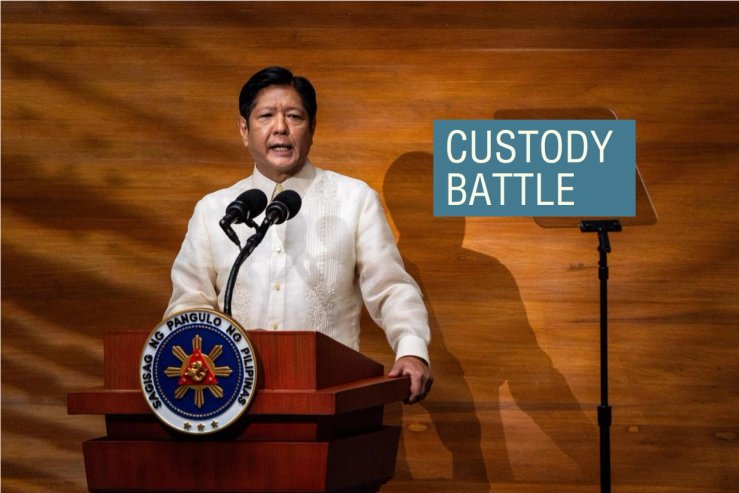The News
Want to get elected in the Philippines? It usually helps to have some famous relatives.
“Between 70% and 90% of elected offices have been controlled by influential families,” according to analyst Richard Heydarian. The last presidential election offered a stark example, as the winning ticket featured scions of two dynasties, the Marcos and Duterte families, in an alliance known as the “Uniteam.” Ferdinand Marcos Jr., son of the dictator Ferdinand Marcos Sr., ran for president alongside vice presidential candidate Sara Duterte-Carpio, son of the previous president Rodrigo Duterte, known for pursuing a brutal drug war.
The alliance welded together Marcos and Duterte support into a remarkably successful concoction that seemed to herald an era even more defined by political brand names; their ticket ended up with around 60% of the vote and raised fears they would look to consolidate power in the ways their authoritarian family predecessors had. But before long, good feelings between the Marcos and Duterte families would give way to “open warfare” that has become the defining dynamic in the country’s national politics — one that could theoretically provide an opening for a political backlash to both dynasties.
In this article:
Know More
Tensions center around the deterioration of relations between Marcos and the elder Duterte, who have slammed each other for drug use, among a range of accusations. Duterte has called Marcos a “drug addict,” while Marcos responded by pointing out Duterte’s own past admission of fentanyl use, claiming that it could be the cause of his outburst. The very public brawl put Duterte’s daughter Sara on the political back foot, and her role in the Marcos government has been reduced.
Presidents in the Philippines are limited to a single term in office, and the family jockeying for power is already fueling speculation about the next election’s potential nominees. Much speculation has centered around Sara Duterte-Carpio possibly taking up the family mantle at the top of the ticket in the 2028 election. But Duterte’s youngest son, Baste, a millennial and the current mayor of Davao after both his father and his sister, may end up being the family standard bearer in 2028 instead, after his sister raised the prospect this year.
In 2017, the BBC labeled Baste as a “rebel surfer” and noted his popular “adventure reality” show. That year, his father called his son a “jerk” and lambasted his “troubled” family life. Even within the major political families, rivalries run hot.
When it comes to the Marcos family, their hopes may be placed in the president’s cousin Martin Romualdez, who serves as the country’s House Speaker. Senator Imee Marcos, sister of the president, has also been tested as a candidate in some polls.
Brad’s view
The power maneuvering has enraptured the country, with one analyst, Ronald Llamas, comparing it to “Game of Thrones.” But like the show, the most interesting outcomes may also be the most unexpected.
Filipino elections are determined in one, first-past-the-post election, making it possible for winners to secure the presidency with a plurality of votes. While the Duterte and Marcos dynasties were aligned for the 2022 election, the situation in 2028 could be very different. Conflict between the two camps could divide the bloc that elected Marcos, leaving room for a new face — for better or worse.
The most obvious name to capitalize on such a scenario would be Leni Robredo, a liberal and 2022’s election runner-up. Supporters of her “pink revolution” could be fired up after 6 years of a Marcos administration. Her presidential campaign aimed at preserving historical memory around the abuses of the Marcos dictatorship, which has consistently been undermined by the president. Even if Robredo doesn’t run, her movement is likely to be active and energized.
Other names in the mix include Senator Raffy Tulfo, the host of a vigilante justice program, where he confronts supposed wrongful behavior reported by viewers. Critics of the show have accused Tulfo of bullying his targets and creating a “circus” out of serious situations.
The View From China
In office, President Marcos Jr. has moved to reroute his policy from the pro-China leaning of the Duterte administration. Issues over sovereignty in the South China Sea have moved Marcos closer to the United States, in a return to good graces for his family after the US cut ties with his father’s dictatorship in the 1980s.
Duterte, however, has signaled a reversal in course as well. The former president said he would press a claim on the sector of Filipino waters claimed by China in the South China Sea. Duterte’s positioning was seen as a necessary shift to “shore up” his family’s standing ahead of elections.
Notable
- The presidency isn’t all the Dutertes have their eyes on. Three Dutertes — Rodrigo, along with sons Baste and Paolo — could all run for Senate in 2025’s midterm elections, according to Sara.
- For more on global elections check out the Hot List, Brad Glasser’s regularly updated power ranking of the top stories in world politics.



